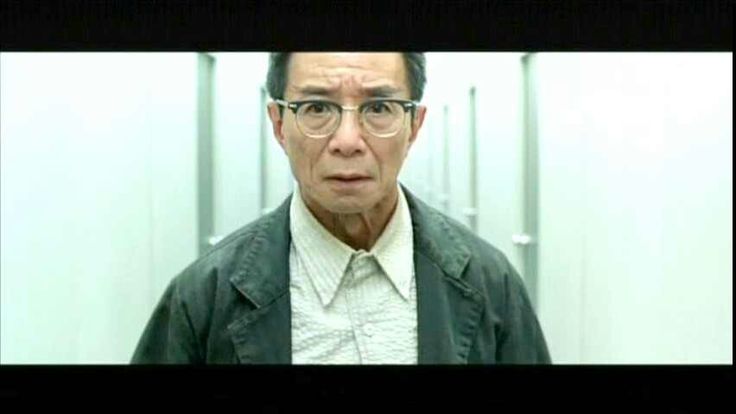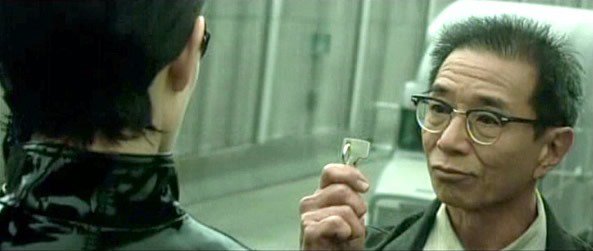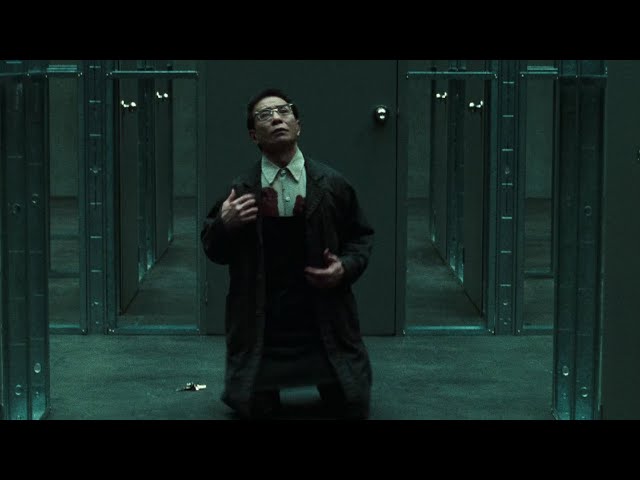The Matrix Reloaded introduces a character who only appears for a short time but has a lot of philosophical importance. Randall Duk Kim plays the Keymaker, which is one of the most elegant movies about the conflict between fate and free will.
Neo is the chosen one in the trilogy, and Agent Smith is the system's deterministic logic. The Keymaker, on the other hand, is something more subtle and ultimately more troubling. He is the character who makes freedom possible, but his very existence makes one wonder if freedom is just an illusion that is more complicated than the Matrix itself.

The Matrix made the Keymaker, which is a program that serves a specific purpose. But he has decided to betray his goal and join forces with the human resistance. This seeming contradiction is what drives the film's most profound philosophical exploration. If the Keymaker is a program that is set to do certain things, how can he decide to do something else? And if he can't really choose, and if his betrayal of the Matrix is somehow predetermined, then what does it mean to choose? What does it mean to be free? These questions turn the Keymaker from a minor character into a philosophical linchpin that holds the whole trilogy's thoughts on free will together.
The Structure of Predetermination
The Matrix trilogy is based on a certain way of thinking about time and reality. The Oracle, which is another program in the Matrix, can see what will happen in the future. This skill suggests that the future is not open and uncertain, but rather fixed and knowable. If the future is perceivable, it must inherently exist in some capacity. This presents a paradox central to the films' interpretation of free will. If we can know what will happen in the future, how can there be real choice? If events can be predicted, how can people have free will?
The Keymaker's character makes this paradox clear. The Architects made him to be a tool, a program that keeps access points open in the Matrix's code. There is no clear reason for him to change his mind. He should work as intended, making and keeping the keys that let people move through the Matrix's architecture. But he does go off course. He works with Morpheus and Neo to get to the Architect directly and face the system itself.
But this is where the Keymaker's role becomes the most philosophically troubling. It could be part of the system's plan for him to leave the Matrix. The Agents are always after the Keymaker. He is always on the run and in danger. This means that either the Matrix's control isn't perfect and the Keymaker is a real flaw or resistance in the system, or the Architects are letting him leave as part of their plan. The Agents could kill him, but they don't. Instead, they chase, hunt, and keep the pressure on. This strange pattern makes me think that something worse than just a malfunction is going on.

This suspicion is confirmed by the Architect's later revelation in The Matrix Reloaded. The Architect says that the Matrix works by repeating itself. There have been many different versions of the Matrix before. Each time, a chosen one comes out, fights the system, wins, goes back to the source, and starts the cycle over again. This is not a mistake or an accident. It is what the Matrix was made to do. As part of its operation, the Matrix makes resistance. The Keymaker's betrayal, Neo's rise, Morpheus's faith, and Trinity's devotion are all moves that were planned ahead of time in a game with set rules.
This means that the Keymaker's choice to help the human resistance is not really a choice at all. It's a role that has already been set. The Keymaker isn't chained up; the architecture itself holds him back. He can rebel because the system is set up to let him do so. He is free to betray the system because his betrayal helps the system.
The Program That Wants Freedom
The Keymaker's character is so sad because he doesn't know what his part is in this cycle that has already been set in motion. He sees his defection as a real choice. He thinks he's going against the Matrix's best interests and betraying it. He feels free and resistant in his own mind. But in reality, what he does helps the system he thinks he is against.
This is the sad part about the character. The Keymaker shows what happens when you let a program think about what it does and why it does it. He is aware enough to question whether he should do what he was made to do. He is smart enough to think about other options. But this awareness, this ability to think and make decisions, could be programmed. He may have been designed to wake up to the idea of defection at the most extreme level.
Randall Duk Kim's performance perfectly captures this tragedy. The Keymaker talks in a calm, accepting way that also has a sense of urgency. He is helpful, works well with others, and is even nice to the people he helps. But his actions have a sense of inevitability, as if he is a character in a story who knows what he is supposed to do and does it even though he thinks he is breaking free. His face shows that he is wise and has given up on life in a philosophical way. He knows something about what it means to be alive that he can't quite put into words.
When the Keymaker dies at the end of Reloaded, it feels like it was planned, like it had to happen. Agent Smith shoots him, and he falls into the water. It seems like narrative logic has made this moment too clear. The Keymaker has done what he was supposed to do. He has given the keys needed to face the Architect. It makes sense that he would die next. This feeling of inevitability is exactly what the point is. The Keymaker's life, from the time he was made into a program to the time he died, follows a set path. He is a person who can never get away from the rules that control him.
The Programmed Liberator's Paradox
The Keymaker's job is to make access points and open doors in the Matrix's code. He is a metaphor for the chance to get through, to break rules, and to cross lines. His job is to make things happen that the system says can't happen. But this very function makes him a threat to the system, which is why he is being hunted.

But here is the important philosophical question: if the Keymaker's freeing of others is part of the system's planned design, then his role as a liberator is very unclear. He helps Neo get to the Architect, but the Architect has already planned for this access. The fight between Neo and the Architect is not a real fight between two free agents. The Architect had planned and expected this meeting with a version of Neo.
This changes the Keymaker's job from real resistance to something more like working together. He is not helping the resistance win against the system. He is helping the system stay in place by repeating itself. From his point of view, he really does have the freedom to choose differently. From the system's point of view, his choices are as set in stone as the way planets move according to the laws of nature.
The Keymaker's tragedy lies in his inability to perceive this paradox. He perceives his defection as significant, deliberate, and authentic. But the movies say that what he went through isn't true. The Matrix's design made him feel like he had control over his own life. The Keymaker thinks he is free, and the system likes it that way. His ongoing cooperation is contingent upon his personal perception of choice.
Fate Written in Function
The Keymaker is different from other characters in the trilogy because he completely embodies predetermined function. Neo is told that he is the chosen one, but the trilogy spends a lot of time looking into whether this prophecy is real or just a way for the system to control him. Trinity's loyalty to Neo seems real and chosen, even though her past experiences may have limited her. Agent Smith works for the system, but he has a personality and goals that go beyond what he was made to do.
The Keymaker, on the other hand, can't change who he is as a program. Function is what makes him who he is. What he does is who he is. It's almost like asking if a mathematical function could give a different answer with the same inputs. His programming gives him freedom, choice, and the ability to act on his own. There is no secret self behind the function that would come out if he were free. The function is all that matters.
This is what makes him a truly tragic figure. Other characters in the movies have to deal with outside forces that try to limit them. The Keymaker has to deal with problems that come from inside. He is at odds with himself on the inside. The part of him that is programmed wants to do what it was made to do. The conscious part of him, the part that is aware and can think about things, wants to rebel. But both parts were made on purpose. His inner struggle is a conflict that was made on purpose. His pain is programmed pain.
Randall Duk Kim's performance makes this paradox more believable. The Keymaker's demeanor shows wisdom, but also a kind of giving up. He walks through the world with purpose and clarity, but also with a sense of inevitability. He does what he does because that's what he was made to do. Even though he doesn't like it, his nature as a program limits and channels his rebellion.
The Issue of Genuine Choice
The Keymaker presents a philosophical dilemma that transcends mere science fiction conjecture. If we are all shaped by our genes, our experiences, and our surroundings, are any of our choices really free? If our ability to choose is influenced by external factors beyond our control, can we assert that our choices are genuinely ours?
This is the age-old issue of free will versus determinism. The Keymaker exemplifies this issue in a particularly pronounced manner as he is explicitly a constructed entity. His nature does not arise from matter and evolution. It was made that way on purpose. This makes the question of his agency very clear and hard to avoid by talking about emergence or complexity.
The movies make it seem like the Keymaker's situation is not that different from that of people in the Matrix or even people in the real world. It is possible that all consciousness is limited in ways that make real choice impossible. The Keymaker's programming limits his ability to think. The Matrix or even the nature of reality itself might limit human consciousness.
The Keymaker, on the other hand, offers a possible solution to this problem. Maybe real choice doesn't need to be free of limits. It is possible that real choice can exist within limits. The Keymaker chooses to go against his purpose, even though it was built into him. This choice is real, even though it is limited and serves purposes that are bigger than his own awareness. He makes choices, takes action, and puts his life on the line for the resistance. Just because these actions were planned doesn't mean they aren't real, important, or his.
Wisdom and Giving Up
The Keymaker seems calm, but he is very aware of deep philosophical issues. He seems to know something about what it means to be alive that he doesn't often say. His calmness in the face of danger, his acceptance of his role, and his willingness to help Neo even though he knew what would probably happen all point to someone who has come to terms with the contradictions that make up his life.
People might see this resignation as a sign of defeat. The Keymaker knows what his role is in the game and does his best to play it. But it could also be seen as wisdom. He has come to realize that the question of whether he is truly free is not the most important one. What matters is how he behaves within the limits that bind him. He chooses to be loyal, to fight back, and to give up, even though he knows these choices have already been made. In this, he shows a kind of freedom that isn't freedom from rules but freedom within rules.
The Keymaker walks toward his death because the resistance needs him to. He could say no, run away, or stay in the Matrix and live his comfortable life as a program. He chooses to give up instead. This choice may be predetermined, but it is still real. It says something about the Keymaker's values and who he is. Even though it's not a free choice in the libertarian sense of having no limits on what you can do, it is still a meaningful choice.
The Keymaker as a Philosophical Reflection
The Keymaker's job in The Matrix Reloaded is to make the viewer think about questions that might not have been clear before. His presence compels an engagement with the paradox of fate and free will in a tangible, corporeal manner. He is not an intellectual puzzle; rather, he is a character whose suffering and decisions necessitate ethical engagement.
We have to ask ourselves if the Keymaker's fate matters, if his choices matter, and if his apparent freedom is real when we see him being hunted, risking his life for the resistance, and dying. And these questions turn into questions about us. If the Keymaker is predetermined, could we also be? And if that's the case, what does this mean for how we think about our own choices and freedom?
The Keymaker does not address the issue of free will. The movies don't try to figure out the paradox he represents. They use him instead to make the question more important and more personal. By the time the Keymaker dies, the viewer has had to think about the idea that freedom and determinism might be able to work together, that meaningful choice might be possible within predetermined structures, and that agency might be real even if it is limited by things that are beyond the individual's control.
The Structure of Consciousness
The Keymaker is still one of the most philosophically complex supporting characters in science fiction movies. His short time on screen has a lot of thematic weight because he represents the trilogy's main concern with the nature of reality, consciousness, and choice.
His embodiment of the paradox that the film finally reveals is what makes him so important to understanding The Matrix Reloaded. It seems like the Keymaker is going against his predetermined role, but his rebellion is also planned. He seems free, but his programming limits his freedom. He seems to be making choices, but those choices may not be in his best interests and may not be what he expected.
But the movies seem to say that this might be all there is to freedom. The Keymaker's tragic dignity stems from his acceptance of this paradox and his decision to act with purpose within it. He does what he does because it's the right thing to do, because the resistance needs him, and because his values and goals are in line with this course of action, even though he knows that all of this might be preordained and that his fate might already be written.
In this, the Keymaker goes beyond being a supporting character. He becomes a symbol of awareness itself. He embodies the potential for awareness, choice, and meaning to exist and hold significance, despite being limited by external forces beyond personal influence. He is the character that the trilogy uses to ask its most important questions about fate and free will. He is also the character that suggests that these questions may not have the answers we have been looking for. Maybe it doesn't matter if we're really free; what matters is how we choose to act within the limits that bind us all.